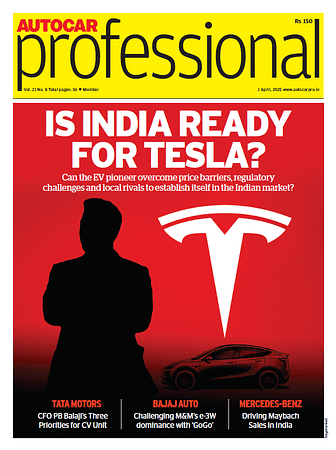Making tech affordable in India is a challenge: Continental's Prashanth Doreswamy
"Unlike traditional vehicles where hardware and software exist in distinct silos, today's smart cars integrate both and there’s an initial investment in separating the two," Doreswamy noted.
Making advanced technology affordable for Indian consumers remains one of its most formidable challenges, in spite of the potential that India's rapidly evolving automotive landscape presents. That's the word coming in from Continental India's President and CEO, Prashanth Doreswamy, as he talks about the challenges manufacturers face in India, especially when it comes to meeting the needs and price sensitivities of the Indian market.
"Making tech affordable remains a key challenge for us. Unlike traditional vehicles where hardware and software exist in distinct silos, today's smart cars integrate both and there’s an initial investment in separating the two," Doreswamy said.
Decoupling software upgrades from hardware enhancements, he adds, will enable consumers to upgrade functions without replacing entire systems. "Consumers will be able to upgrade new functions in the car. It will increase our ability to test in the cloud. The trends indicate a massive uptick in assisted driving functions, with a predicted rise in demand over the next 2-3 years," he adds.
One of the upcoming trends, he said, will be around enhancing user experiences. “User experience and pillar-to-pillar displays will see more demand. Holistic motion control, advanced safety features and smart motion technologies could revolutionize how cars respond to dynamic driving conditions," he said.
But, a significant hurdle on the hardware side is also expected in the future. "Unfortunately, there’s no supplier base for semiconductors in India," Doreswamy said. With India lacking the infrastructure for critical components like semiconductors, companies remain reliant on imports, which in turn drives up costs. "Relying on other countries for tech adds to the cost," he pointed out.
To combat these challenges, Continental’s strategy has been to focus on localization. "Our strategy is to make in the market for the market," Doreswamy said.
The company's approach involves producing as much of the vehicle’s technology locally as possible, ensuring that it’s designed with the Indian market in mind. This not only helps with cost efficiency but also speeds up product adaptation for local needs. "PLI for automotive has been a big success," he said, adding that government initiatives like this are paving the way for manufacturers to invest in local production.
As India’s light vehicle volumes are projected to grow from 4.54 million to 7.5 million by 2030, Doreswamy sees exciting prospects ahead but cautions that new features could add as much as $2,000 to the average car value. "The challenge for automakers will be how to incorporate these premium technologies without alienating a price-sensitive market," he said.
RELATED ARTICLES
Ducati Enters Motocross Market with Desmo450 MX
First Ducati motocross bike features Desmodromic engine and traction control, available in Europe from June 2025.
ZF Introduces Optical Multi-Gigabit Ethernet for Vehicle Electrical Systems
New technology enables data transmission at rates up to 50 Gbit/s over distances of 40 meters, supporting next-generatio...
Hyundai CRETA Leads Indian Auto Sales in March 2025
SUV records highest monthly sales, remains India’s top-selling model in Q4 FY 2024-25.






 04 Oct 2024
04 Oct 2024
 2008 Views
2008 Views





 Shruti Shiraguppi
Shruti Shiraguppi




